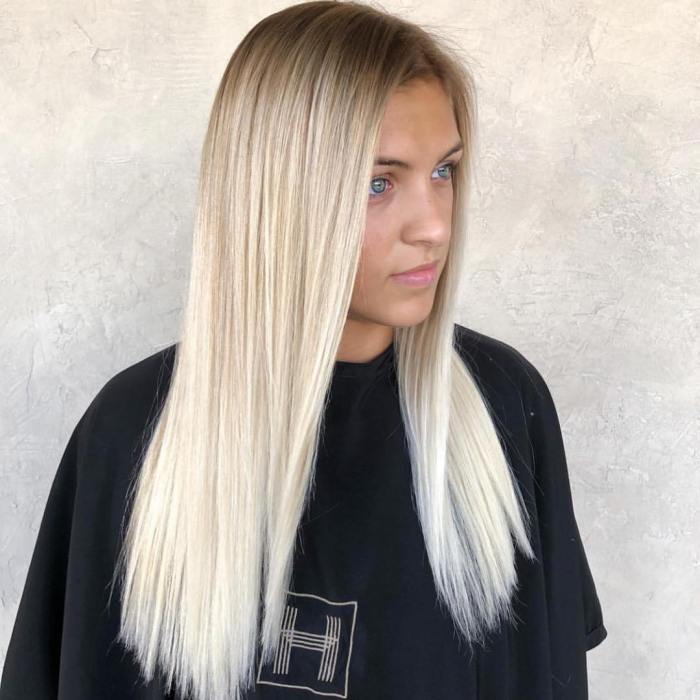Hairstyles for Flat Ironed Hair Styles & Techniques
Popular Flat Ironed Hairstyles
Hairstyles for flat ironed hair – Achieving sleek, straight hair with a flat iron is a versatile starting point for numerous styles. This section explores popular flat-ironed hairstyles, offering step-by-step instructions and variations to inspire your next look.
Popular Flat Ironed Hairstyles: Examples and Steps
Here are five popular flat ironed hairstyles, categorized by style, difficulty, and time commitment:
| Style | Description | Difficulty Level | Time Required |
|---|---|---|---|
| Sleek Straight Hair | Classic, straight hair with a center part. | Easy | 10-15 minutes |
| Beach Waves | Loose, textured waves created using the flat iron. | Medium | 20-25 minutes |
| Flipped Out Ends | Straight hair with outward-curled ends for added volume. | Easy | 15-20 minutes |
| Half-Up Half-Down | A portion of the hair is pulled back, leaving the rest flowing straight. | Easy | 10-15 minutes |
| Sleek Low Ponytail | A low ponytail with perfectly smooth, straight hair. | Easy | 15 minutes |
Sleek Straight Hairstyle Variations, Hairstyles for flat ironed hair
The classic sleek, straight hairstyle offers several variations based on parting and styling techniques:
- Center Part: A classic and symmetrical look, achieved by parting the hair down the middle of the head before flat ironing.
- Side Part: Creates a more modern and asymmetrical look, adding a touch of elegance or edginess depending on the styling. A deep side part can be particularly dramatic.
- Zig-Zag Part: A playful and unique variation, achieved by creating a zig-zag pattern before straightening. This adds subtle texture and visual interest.
Classic vs. Modern Straight Hairstyles
While the classic straight hairstyle emphasizes perfect smoothness and a uniform texture, the modern interpretation allows for more subtle variations. Modern styles may incorporate a slight bend at the ends, a less-than-perfect part, or a touch of volume at the crown for a less severe look. The classic style prioritizes a completely flat, uniform finish, whereas the modern approach embraces a more relaxed, natural feel.
Flat Iron Techniques for Different Hair Types: Hairstyles For Flat Ironed Hair
Proper flat ironing techniques vary depending on hair type. Understanding these differences is crucial for achieving optimal results and preventing damage.
Flat Ironing Techniques for Different Hair Types
Here’s a comparison of flat ironing techniques for different hair types:
- Fine Hair: Use a lower heat setting (around 250-300°F) and avoid multiple passes over the same section to prevent damage. A lightweight heat protectant spray is recommended.
- Medium Hair: A medium heat setting (around 300-350°F) is generally suitable. Use a heat protectant spray or serum to shield hair from heat damage.
- Thick Hair: Higher heat settings (around 350-400°F) may be necessary, but always prioritize heat protection. Sectioning the hair into smaller parts is crucial for even heat distribution.
Preparing Hair for Flat Ironing
Pre-styling preparation is key to protecting hair and achieving a smooth, sleek finish:
- Fine Hair: Use a volumizing mousse or root lift spray before blow-drying to add body and prevent the hair from looking limp after straightening.
- Medium Hair: A lightweight heat protectant serum or spray is usually sufficient. Blow-dry hair until it’s about 80% dry before flat ironing.
- Thick Hair: Apply a generous amount of heat protectant cream or serum to help manage the hair and protect it from damage. Thoroughly blow-dry hair before flat ironing to ensure it’s completely dry.
- Curly Hair: Use a heat protectant cream or oil and detangle thoroughly. Consider using a smoothing serum or balm to help reduce frizz and make the straightening process easier.
Common Flat Ironing Mistakes
Avoiding these common mistakes will help protect your hair and ensure better results:
- Using Too Much Heat: Excessive heat can damage hair, leading to breakage and dryness. Always use the lowest effective heat setting for your hair type.
- Not Using a Heat Protectant: A heat protectant is essential to shield hair from damage caused by high temperatures. Always apply a heat protectant before flat ironing.
- Pulling the Flat Iron Too Tightly: This can lead to breakage and damage. Gently glide the flat iron through the hair, avoiding pulling or tugging.
Maintaining Flat Ironed Hair
Maintaining the sleekness and shine of flat ironed hair requires a dedicated hair care routine and the right products.
Daily Hair Care Routine for Flat Ironed Hair
A simple daily routine can help maintain your straight style:
- Gentle Cleansing: Use a sulfate-free shampoo and conditioner to avoid stripping natural oils.
- Leave-In Conditioner: Apply a lightweight leave-in conditioner to add moisture and detangle.
- Heat Protection: Use a heat protectant spray or serum before using any heat styling tools, even if you’re not flat ironing.
- Silk or Satin Pillowcase: Sleeping on a silk or satin pillowcase minimizes friction and helps prevent frizz and breakage.
Using Serums, Oils, and Sprays

Source: xuzinuo.com
These products help maintain smoothness and shine:
- Serums: Lightweight serums add shine and control frizz without weighing down the hair.
- Oils: Hair oils add moisture and shine, particularly beneficial for dry or damaged hair. Apply sparingly to avoid weighing down the hair.
- Sprays: Anti-frizz sprays help to control flyaways and keep hair smooth throughout the day.
Preventing Frizz and Flyaways
Here’s how to minimize frizz and flyaways:
- Use a humidity-blocking spray: This creates a protective barrier against moisture.
- Avoid touching your hair excessively: Touching your hair can transfer oils and disrupt the smoothness.
- Consider using a smoothing balm or cream: These products help to tame flyaways and add shine.
Styling Variations with Flat Ironed Hair
Flat ironed hair provides a fantastic base for various updos and styling variations.
Updos with Flat Ironed Hair
Here are three updo options starting with flat ironed hair:
| Updo Name | Description | Steps | Difficulty Level |
|---|---|---|---|
| Sleek Bun | A classic, low bun with perfectly smooth hair. | Gather hair into a low ponytail, twist into a bun, and secure with bobby pins. | Easy |
| High Ponytail | A high ponytail with sleek, straight hair. | Gather hair into a high ponytail and secure with a hair tie. | Easy |
| Braided Updo | A more intricate updo incorporating braids. | Create one or more braids, then incorporate them into a bun or other updo style. | Medium |
Creating Waves or Curls with a Flat Iron
Achieving waves or curls with a flat iron on previously straightened hair offers versatility:
- Loose Waves: Twist sections of hair around the flat iron and gently pull through for a soft, beachy wave.
- Tighter Curls: Wrap smaller sections of hair tightly around the flat iron for a more defined curl. The smaller the section, the tighter the curl.
- Varying Texture: Experiment with different techniques and section sizes to achieve various textures, from loose waves to defined curls.
Accessories for Flat Ironed Hair
Accessories can enhance the look of flat ironed hair:
- Headbands: Add a touch of elegance or playfulness, complementing various hairstyles.
- Barrettes: Ideal for adding subtle accents or creating more intricate styles.
- Hair Clips: Versatile for securing sections of hair or creating unique looks.
- Scarves: Add a bohemian touch, tying a scarf around a ponytail or bun.
- Hair Jewelry: Adds a touch of glamour, suitable for formal occasions.
Flat Ironed Hair and Different Occasions
Flat ironed hair serves as a versatile base for hairstyles suitable for various occasions.
Formal Occasion Hairstyles
Here are three formal hairstyles starting with flat ironed hair:
- Sleek Low Bun with Hair Jewelry: A classic, elegant style enhanced with decorative hairpins or a jeweled hair clip.
- Side-Swept Waves with a statement earring: Create soft waves using a flat iron and sweep them to one side, complementing a statement earring.
- High, Polished Ponytail: A sophisticated and timeless look, perfect for formal events.
Casual Everyday Hairstyles
Adapting flat ironed hair for casual wear prioritizes speed and simplicity:
- Straight and Simple: A quick and easy style that requires minimal effort.
- Half-Up Half-Down: A casual yet stylish option that adds a touch of elegance.
- Low Ponytail or Messy Bun: Effortless styles perfect for busy days.
Hairstyles for Different Face Shapes

Source: pophaircuts.com
Sleek, straight styles are popular choices for flat ironed hair, offering a versatile base for various looks. The options expand considerably when considering the specific needs of different hair types and colors; for example, discovering stylish options for those transitioning to grey hair can be simplified by exploring resources such as this helpful guide on hairstyles for grey hair women.
Returning to flat ironed hair, remember that simple updos or added waves can easily transform a basic straight style.
Choosing the right hairstyle complements different face shapes:
- Round Face: Styles with volume at the crown and longer layers help to elongate the face. Avoid blunt bangs.
- Oval Face: Most hairstyles work well with oval faces, offering versatility in styling.
- Square Face: Soft waves or curls around the face soften the jawline, while side parts help to balance the features.
- Heart Face: Styles with volume at the bottom and sides help to balance the wider forehead. Avoid styles that are too tight or pulled back.
FAQ Overview
How often should I flat iron my hair?
Over-flat ironing can damage your hair. Aim for no more than 2-3 times a week, depending on your hair type and health.
What’s the best heat protectant for flat ironing?
Many heat protectant sprays and serums are available. Choose one suited to your hair type; look for ingredients like silicone or keratin.
How do I prevent heat damage when flat ironing?
Always use a heat protectant, work in sections, and don’t hold the flat iron on one spot for too long. Adjust the heat setting to your hair type.
Can I flat iron my hair every day?
Daily flat ironing is generally discouraged as it can lead to significant heat damage, dryness, and breakage. Aim for less frequent use.













